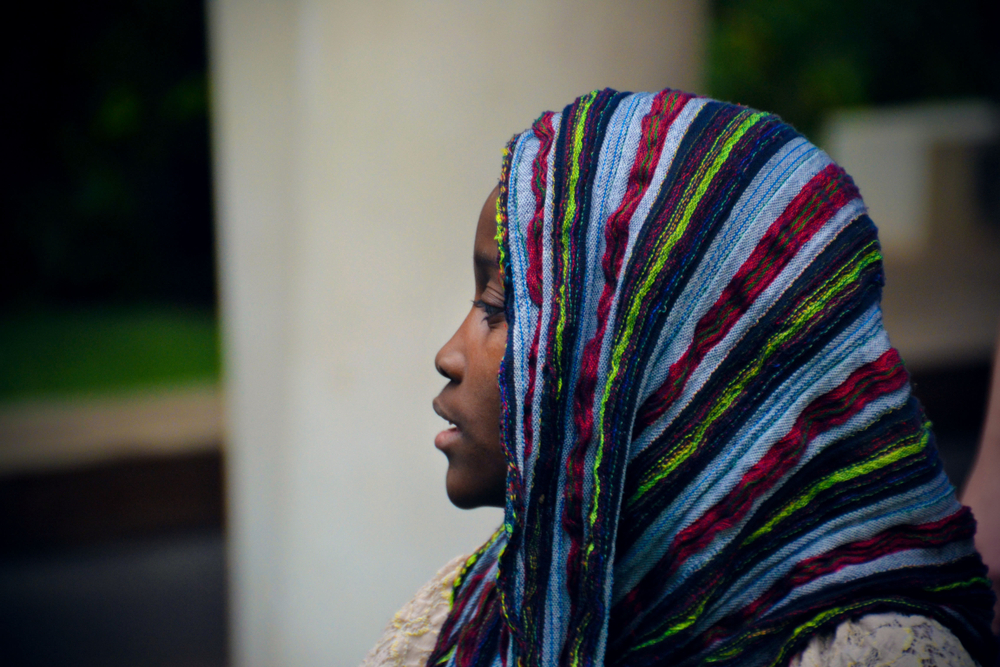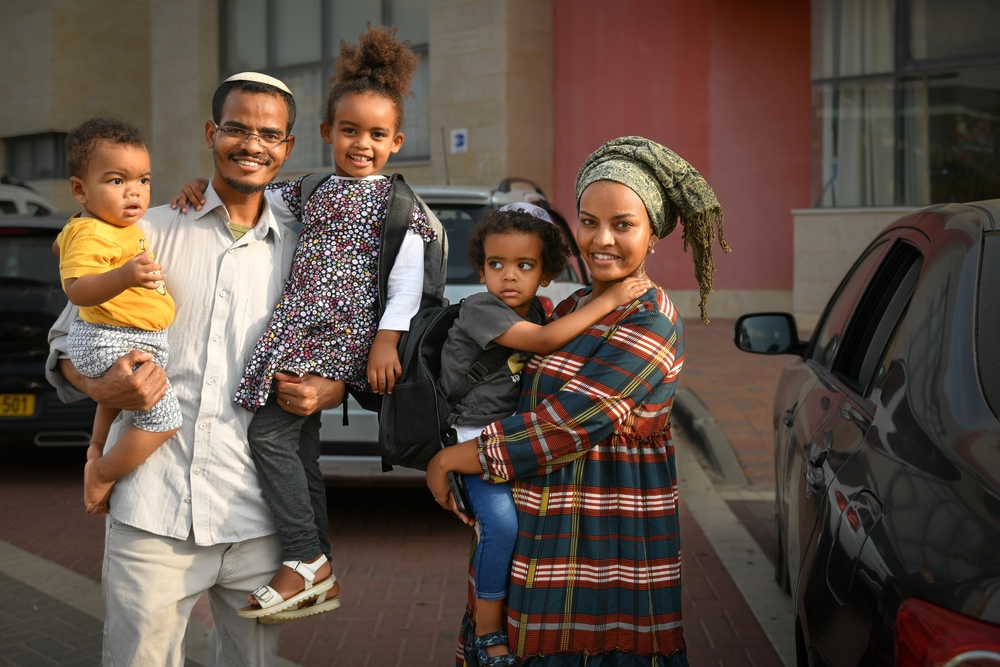The persistent systemic discrimination faced by Ethiopian Jews in Israel has left Ethiopian immigrants in a distressing state as they persist in their struggle for equal rights. This community confronts significant challenges, such as disproportionately high rates of incarceration, discriminatory incidents within the education system, and elevated poverty rates that impact the mental well-being of the children in the country.
Realities for Ethiopian youth in Israel
Ethiopian Jews began migrating to Israel in the late 1970s amid the Ethiopian Civil War and famine. Due to their historical isolation, they developed distinct religious practices, diverging from mainstream Judaism. As a result, their unique identity has contributed to challenges in fully integrating into Israeli society, where they are not regarded as first-class citizens (Winchester, n.d.).
The Ethiopian community in Israel, constituting over 145,000 people, represents less than 2% of the nation’s population. Unfortunately, a stark reality persists within this community, with over half of its members living below the poverty line. A significant contributing factor to their plight is the Chief Rabbinate’s non-recognition of Ethiopians and their children as fully Jewish, leading to systemic discrimination and marginalization (Krämer, 2018).
The challenges faced by parents of young Ethiopians in the country are particularly heightened in under-resourced neighborhoods, where the children confront issues such as substance use and violence. Additionally, overcrowded living conditions and widespread alcohol consumption underscore the considerable difficulties experienced by Ethiopian youth within Israeli neighborhoods (Walsh, 2023).
Integration challenges for adolescent Ethiopian Immigrants

Since the late 1990s, there has been a concerning rise in juvenile delinquency and school dropout rates among Ethiopian youth, accompanied by an alarming increase in depression and suicide cases. These challenges manifest as a profound sense of “feeling different” among the youth, marked by emotions such as despair, sorrow, sadness, disappointment, humiliation, disrespect, and devaluation in their professional lives (Walsh et al., 2012).
Furthermore, prevalent feelings of inferiority, hopelessness, and helplessness permeate their social experiences. Qualitative research on the experiences of adolescent Ethiopian immigrants in Israeli society underscores an enduring struggle with integration challenges, with cultural gaps and the stigma associated with dark skin color identified as significant obstacles (Walsh et al., 2012).
As a result, mental health became a prominent concern in Israel, especially for minority groups like Ethiopians, who, despite their small population, experience high rates of psychiatric hospitalization. However, the challenge persists as appropriate access to mental health care remains elusive for minorities in the country. One specific obstacle is the severe shortage of health providers fluent in Amharic, compounded by the stigma surrounding mental health issues (Shapiro et al., 2023)
Addressing discriminatory practices in the education system
The extent of racist offenses and discrimination against Ethiopian Jews manifests in various aspects, including reluctance by factories to employ them, landlords refusing housing, and specific schools rejecting their children. In a troubling incident unveiled by the Israeli NGO Tebeka in September 2011, 281 children of Ethiopian descent were unlawfully denied registration at a school in the Central District of Israel. This not only constituted a clear violation of children’s right to education but also reflected a broader pattern of exclusion within the country (Refworld, 2012).
In a separate incident, an Ethiopian mother and resident of Israel reported that on her daughter’s first day of kindergarten, the child was placed in a classroom exclusively composed of Ethiopian Israeli youngsters. Despite the school justifying the placement based on the geographic area of the children, parents publicly perceive it as a result of the color of their skin, expressing concerns about potential discrimination (Sokol, 2019).
In addition, in 2019, a group of Ethiopian-Israeli parents took legal action against four ultra-Orthodox schools in Jerusalem that refused to enroll their children for the upcoming school year, further highlighting the persistent barriers in the education system (Surkes, 2019). These incidents underscore the urgent need to address discriminatory practices and promote inclusivity within the educational framework.
Struggle for equality
Since 2015, Israeli law has allowed the imprisonment of children as young as 12. However, there is a growing call to align this law with the Israeli Youth Law, intended for all children. Unfortunately, evidence suggests a discriminatory implementation by Israeli authorities (European Parliament, 2016).
This is particularly concerning when considering that young offenders of Ethiopian descent are three times more likely to be incarcerated, and almost 90% of them received prison sentences (Yaron, 2016). Moreover, this disparity is exemplified by the complete denial of rights to Palestinian children from the moment of arrest to the conclusion of legal proceedings (European Parliament, 2016).
In a separate incident, in 2019, the tragic shooting of Solomon Tekah, an unarmed Ethiopian teenager, further underscored the difficulties Ethiopian children face in the country. This incident shed light on broader challenges experienced by Ethiopian Jews, particularly children, including the disproportionately elevated levels of police stop-search and arrests (Deveci, 2019).
The UN committee has consistently expressed concerns about the implementation of discriminatory laws affecting Ethiopian children, but also Palestinians, Arab Israelis, and Bedouins. What’s particularly troubling is the implementation of two distinct legal systems that result in de facto segregation and also contribute to inequality in the rights between Israeli children and those from diverse backgrounds (United Nations, 2013).
Collaborative solutions for all children
Discriminatory practices rooted in ethnicity and race starkly defy the principles enshrined in the Convention on the Rights of the Child, a commitment Israel undertook in 1990 (United Nations, 2007). Regrettably, despite this pledge, Israel has yet to fully realize the guaranteed rights of children.
To rectify this, it is essential to prioritize initiatives such as ensuring equal educational opportunities and empowering communities to address socio-economic challenges. Bridging this gap is not only imperative but also underscores the crucial need for Israel to align its practices with the international standards it committed to over three decades ago.
By coordinating actions, sharing resources, and aligning goals, the Israeli government, NGOs, healthcare professionals, legal advocates, educators, and community leaders can collectively work towards implementing comprehensive solutions for the betterment of not only Ethiopian children but also other minority groups in Israel.

Here at Humanium, we support these efforts to dismantle discriminatory practices, foster inclusivity, and create a supportive environment for all children to thrive. If you’d like to contribute to these initiatives, please consider donating, volunteering, or sponsoring a child.
Written by Lidija Misic
Bibliography:
Deveci Mustafa (2019), Ethiopian Jews suffer racism in Israel. Retrieved from Anadolu Agency at https://www.aa.com.tr/en/middle-east/ethiopian-jews-suffer-racism-in-israel/1526782. Accessed on February 2, 2024.
European Parliament (2016), New Israeli law allows children as young as 12 to be jailed. Retrieved from the European Parliament at https://www.europarl.europa.eu/meetdocs/2014_2019/documents/dpal/dv/4d_dci-p_new_israeli/4d_dci-p_new_israelien.pdf. Accessed on February 2, 2024.
Krämer Tania (2018), Are Ethiopian Jews Israel’s second-class citizens? Retrieved from Deutsche Welle at https://www.dw.com/en/ethiopian-jews-israels-second-class-citizens/a-45687623. Accessed on February 2, 2024.
Refworld (2012), Israel: The tribulations of being an Ethiopian Jew. Retrieved from Refworld at https://www.refworld.org/docid/4f34ff422.html. Accessed on February 2, 2024.
Shapiro Ephraim et al. (2023), Mental Health and Care Utilization Among Ethiopian-Israeli Immigrants During the Period of COVID-19. Retrieved from National Library of Medicine at https://www.ncbi.nlm.nih.gov/pmc/articles/PMC10022572. Accessed on February 2, 2024.
Sokol Sam (2019), After Ethiopian-Israeli kindergarten scandal, ministry vows end to segregation. Retrieved from The Times of Israel at https://www.timesofisrael.com/after-ethiopian-israeli-kindergarten-scandal-ministry-vows-end-to-segregation/. Accessed on February 2, 2024.
Surkes Sue (2019), Ethiopian-Israeli parents petition against Haredi schools’ rejection of children. Retrieved from The Times of Israel at https://www.timesofisrael.com/ethiopian-israeli-parents-petition-against-haredi-schools-rejection-of-children/. Accessed on February 2, 2024.
United Nations (2007), Rights of Child Convention/Children and armed conflict protocol – Israel – Initial report. Retrieved from United Nations at https://www.un.org/unispal/document/auto-insert-176905/. Accessed on February 2, 2024.
United Nations (2013), Rights of Child Convention/Second to fourth periodic reports of Israel – Cttee on Rights of Child – Concluding observations (advance unedited version). Retrieved from United Nations at https://www.un.org/unispal/document/auto-insert-195417/. Accessed on February 2, 2024.
Walsh D. Sophie (2023), Risk, resilience and family relationships among at-risk Ethiopian immigrant youth in Israel: A focus group investigation. Retrieved from Wiley Online Library at https://onlinelibrary.wiley.com/doi/full/10.1111/famp.12915. Accessed on February 2, 2024.
Walsh Sophie et al. (2012), Ethiopian Emerging Adult Immigrants in Israel: Coping With Discrimination and Racism. Retrieved from ResearchGate at https://www.researchgate.net/publication/234076823_Ethiopian_Emerging_Adult_Immigrants_in_Israel_Coping_With_Discrimination_and_Racism. Accessed on February 2, 2024.
Winchester Atira (n.d.), The History of Ethiopian Jewry. Retrieved from My Jewish Learning at https://www.myjewishlearning.com/article/the-history-of-ethiopian-jewry/. Accessed on February 3, 2024.
Yaron Lee (2016), Israeli Youth Offenders of Ethiopian Descent Three Times More Likely to Go to Prison. Retrieved from Haaretz at https://www.haaretz.com/israel-news/2016-09-22/ty-article/.premium/israeli-youth-offenders-of-ethiopian-descent-more-likely-to-go-to-prison/0000017f-e753-dc7e-adff-f7ff59890000. Accessed on February 2, 2024.


